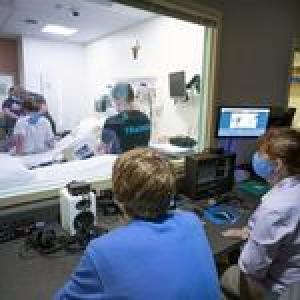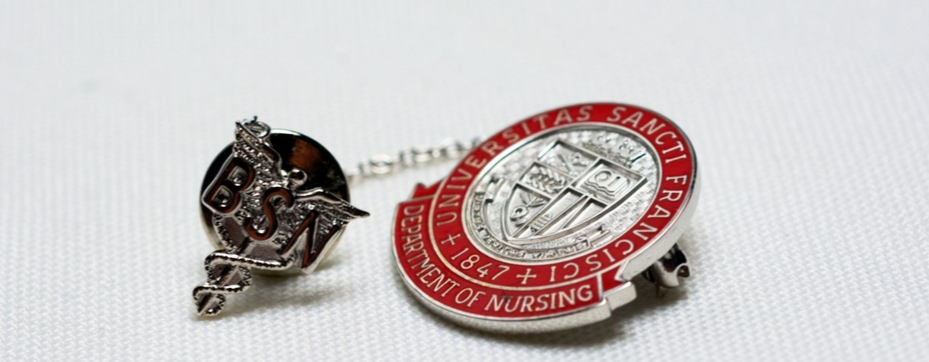
DEPARTMENT OF NURSING
Nursing, Bachelor of Science
Introduction
Earn a Prestigious BSN Degree from Saint Francis University
To succeed in nursing, you need to be ready for an innovative, high-touch profession where learning never stops, and patient care is the top priority. The Saint Francis University Department of Nursing utilizes exceptional learning opportunities to prepare future registered nurses to provide safe quality care in various patient-centered health care environments.
Offered: On-Campus with Clinical Components

our graduates have consistently exceeded the National First Time-Taker Pass Rates on the NCLEX-RN exam

work hands-on with simulated patients in our ELC and with real patients through clinical rotations in hospital settings

Franciscan values are embedded in the coursework, ensuring we graduate caring, ethical nurses
The SFU LEARNING EXPERIENCE
Undergraduate Nursing the Saint Francis Way
Our nursing students enjoy a unique camaraderie through small clinical groups (1-8 faculty-student ratio). Faculty know students by name in our close-knit department. Each student receives an assigned faculty advisor throughout the program. Planned online and face-to-face meetings ensure students have every opportunity to succeed.

Student Experience Highlights
- Our Nursing program is ranked in the top 5 Best RN Programs in Pennsylvania by RegisteredNursing.org.
- Access to state-of-the-art technology in our Experiental Learning Commons.
- Our Nursing program incorporates Franciscan values into the curriculum to ensure that our graduates are prepared to be ethical, compassionate professionals.
- Our faculty dedicate themselves to helping students prepare for the Students and faculty regularly volunteer for University-sponsored clinics for the underserved in the spirit of St. Francis of Assisi.
- Members of the Student Nursing Organization regularly attend state and national conventions to gain exposure and build contacts.
- Our well-rounded Nursing students often participate in athletics, Greek life, and many other collegiate activities.
CURRICULUM & COURSES
What You’ll Learn in the BSN Program
Baccalaureate education in nursing provides each student with the knowledge base for practicing professional nursing. The curriculum is based on a liberal arts foundation in the Judeo-Christian tradition and utilizes the AACN Essentials of Baccalaureate Education for Professional Nursing Practice within an integrated caring curriculum. Upon completion of the curriculum, the graduate possesses a foundation for graduate study.

Undergraduate Degree Path in Nursing
Bachelor of Science in Nursing Traditional (on-campus)
Successful graduates of this program earn a Bachelor of Science in Nursing and possess the foundation for graduate study. A graduate is eligible to sit for the R.N. licensure exam, NCLEX-RN®
Additional Degree Paths:
BSN Second Degree Track (on-campus)
Enables a non-nurse with a baccalaureate degree (BA/BS), the ability to earn a BSN in as little as 18-months
2nd degree BSN | Saint Francis University
Graduate Nursing Programs
MSN Family Nurse Practitioner Track
Key Topics Covered
- clinical reasoning, cultural competence, patient care technologies, and interprofessional collaborative practice
- professional nursing standards aligned with the American Nurses Association Standards of Professional Performance
- strong science foundation including human anatomy, chemistry, and biology
- the "Art and Science" of nursing through robust humanity/liberal arts core
- ethics and values of a caring profession
- caring for individuals, families, groups, communities, and populations
- hands-on simulated and professional clinical experiences
- nursing leadership and management theory
Upon successful completion of the undergraduate nursing program, you will be able to:
- Synthesize knowledge from nursing, the arts, sciences, and humanities for the development of intellectual and practical abilities, which form the foundation for nursing practice.
- Embrace the concept of Patient-Centered Care as the core purpose of nursing as a discipline.
- Examine the principles of population health for the purpose of achieving equitable outcomes and improved health status.
- Utilize the research process to acquire evidence-based practices which enhance the nurse’s collaborative role in clinical decision-making, improving health, and providing optimal care.
- Employ quality care improvement and patient safety practices to achieve desired health outcomes that are consistent with patient preferences and current professional knowledge.
- Collaborate with the interprofessional team to establish healthcare goals for individuals, communities, and populations.
- Apply knowledge of healthcare systems to effectively coordinate resources in providing safe, quality, and equitable care.
- Utilize information and communication technologies and informatics processes to promote efficient communication, and to assist patients and consumers to improve health and manage health conditions.
- Exemplify a professional nursing identity that reflects the characteristics and values of the discipline.
- Develop personal, professional and leadership attributes to promote self-awareness, personal growth, and positive opportunities.
Certification/Professional Licensure
Upon graduation from the BSN program, all students must pass the NCLEX to receive the RN license.

Department of Nursing Faculty
Benefit from our Experienced Faculty
The nursing undergraduate faculty teach with a philosophy of learning as a self-motivated and voluntary endeavor on the part of nursing students. Using our “curriculum of caring” as a source of inspiration, we have moved away from the traditional role of teacher to that of “facilitator of learning” to help you take on the responsibility of self-direction. We support you as you develop the best ways of learning and becoming the best nurse possible.
Nursing Program Chair: Dr. Kimberly Forst, DNP, RN, kforst@francis.edu, 814-472-3027
Accreditation
The baccalaureate degree program in nursing at Saint Francis University are accredited by the Commission on Collegiate Nursing Education (http://www.ccneaccreditation.org).
BSN Program Outcomes
BSN program completion rates for students entering into the professional phase of the nursing program and graduating within 6 semesters are at a minimum of 70% or higher.
2024 Graduates | 2023 Graduates | 2022 Graduates | 2021 Graduates | 2020 Graduates |
| 97.44% | 92.31% | 88.57% | 100% | 100% |
BSN Program graduates have consistently exceeded the National First-Time Taker Pass Rates on the National Council Licensure Examination (NCLEX-RN) on their first attempt.
| Year | Number of First Time Takers | Program First Time Taker Pass Rate | National First Time Taker Pass Rate |
| 2024 | 39 | 97.44% | 91.16% |
| 2023 | 40 | 92.5% | 89% |
| 2022 | 35 | 85.5% | 79.9% |
| 2021 | 24 | 95.83% | 86.06% |
| 2020 | 21 | 95.24% | 90.29% |
| Five Year First Time Taker Average | 93.83% | 87.29% | |
The BSN program graduate employment rate is at a minimum of 80% or higher as evidenced through data collected within 12 months of program completion.
2024 Graduates | 2023 Graduates | 2022 Graduates | 2021 Graduates | 2020 Graduates |
100% employed | 100% employed | 100% employed | 100% employed | 100% employed |
Career Outlook in Nursing
Nurses are in high demand. Job placement is 100% for those seeking employment in the hospital setting and many nurses are receiving substantial sign-on bonuses!
Career Opportunities
The field of nursing offers a wide array of career opportunities in areas such as;
hospitals
home health
nursing care facilities
outpatient facilities
military
Salary Potential
According to the Bureau of Labor Statistics the median pay for nurses in 2023 was $93,600 per year.
FAQs
Frequently Asked Questions About Nursing and Saint Francis University
-
We are proud to honor the achievements of our students every chance we get through celebrations such as the White Coat Ceremony where students receive their white lab coats and pins as an official welcome into the clinical phase of the nursing program.
-
Here are some of the opportunities that our graduates have taken:
- Clinical nurse on a medical-surgical unit
- Neonatal intensive care unit nurse
- Cardio-thoracic intensive care unit nurse
- Home health nurse
- Nurse practitioner
- Nursing professor
- Hospital staff development instructor
- Nurse administrator
- Labor and delivery unit nurse
- Army nurse
- Nursing home administrator
- Nursing home nurse
We are proud to honor the achievements of our students every chance we get through celebrations such as the White Coat Ceremony where students receive their white lab coats and pins as an official welcome into the clinical phase of the nursing program.
Here are some of the opportunities that our graduates have taken:
- Clinical nurse on a medical-surgical unit
- Neonatal intensive care unit nurse
- Cardio-thoracic intensive care unit nurse
- Home health nurse
- Nurse practitioner
- Nursing professor
- Hospital staff development instructor
- Nurse administrator
- Labor and delivery unit nurse
- Army nurse
- Nursing home administrator
- Nursing home nurse